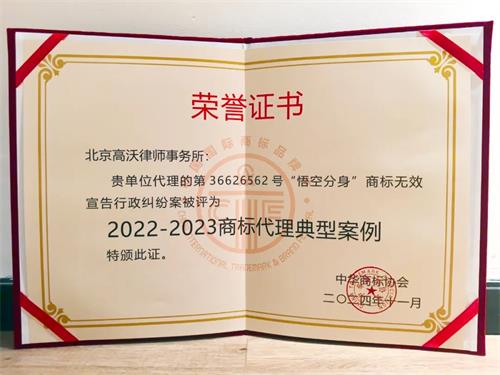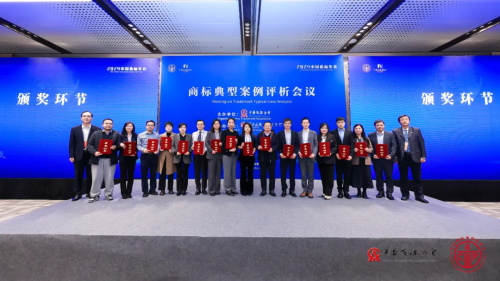The 14th China International Trademark and Brand Festival, hosted by the China Trademark Association, will be held in Xi'an from November 22 to 25, 2024. At the trademark typical case analysis meeting held on November 24th, the administrative dispute case of invalidation of the Wukong clone trademark represented by Beijing Gaowo Law Firm stood out and was awarded the 2022-2023 trademark agency typical case.

This honor is a recognition and affirmation of the patent strength of the Gaowo team in the field of trademark legal practice! On that day, the China Trademark Association awarded an honorary certificate to my representative and conducted a typical analysis of the significance of the case. The case involves the mobile phone software Internet industry, and the collection and collation of its use evidence provides an important reference for such cases.

Representative of the Director of Gaowo Trademark Business Unit received the award
Over the years, the Gaowo Intellectual Property Service Team has accumulated rich experience in the field of trademarks, accurately understanding and grasping the guidance documents and policy regulations of courts and trademark offices at all levels, deeply exploring the core points of each case, and exploring the most favorable entry direction. At the same time, through comprehensive and multi-channel collection of relevant evidence and prior cases, various strategies are formulated to fully protect the rights and interests of customers. Whether it is trademark administrative cases such as trademark opposition and invalidity, or infringement dispute litigation cases, Gaowo has achieved remarkable results with outstanding professional competence and unremitting efforts.
Gaowo will take this honor as an opportunity to continue adhering to the principle of wholeheartedly creating value for customers, deepening services, and safeguarding customers' intellectual property rights!
Introduction to award-winning cases
Case Details
customer
Xiamen Quantum Stack Technology Co., Ltd
brand
Customer first use: Wukong Clone APP
Trademark dispute: Wukong clone
Registered person (third party in the lawsuit): Xiamen Maji Brothers Network Technology Co., Ltd
Category: 09
Trademark number: 36626562
Approved product for use: 0901 downloadable computer application software; 0901 downloadable computer program; 0901 is a computer game software that can be downloaded from global computer networks; 0901 Recorded Computer Operating Programs; 0901 Recorded Computer Program; 0901 monitoring program (computer program); 0901 downloadable images for mobile phones; 0901 Computer Hardware; 0901 Computer Software (Recorded); 0913 Microchip (Computer Hardware)
The plaintiff Xiamen Quantum Stack Technology Co., Ltd. (our client) has acquired the copyright of the Wukong Clone APP software and has listed it on platforms such as Doudoujia, Tencent App Store, Huawei, Oppo, Vivo, etc. It has used the trademark name first and applied for registration of the Wukong Clone trademark on Class 09 goods.
However, the trademark was rejected due to its similarity with the Wukong clone registered under the third party Xiamen Maji Brothers Network Technology Co., Ltd. under the number 36626562, resulting in the inability to obtain authorization for the client's core and important trademarks. At the same time, a third party filed a complaint against the Wukong clone app, which was listed by customers on various open platforms, on the grounds of trademark infringement, resulting in the app being taken down by multiple platforms. As a competitor in the same industry, a third party renamed their WeChat X clone app to Wukong clone after the client app was taken down, causing confusion and misidentification among the relevant public. The third party's behavior seriously infringed on the legitimate rights and interests of the client, bringing huge difficulties to the client's business operation.
In the face of malicious rush registration by a third person, the customer filed a request for invalidation, which was finally determined by the China National Intellectual Property Administration that the registration of the trademark in dispute did not violate the relevant provisions of the Trademark Law, and ruled to maintain the trademark in dispute.
Gaowo's legal representative communicated with the client regarding the case, analyzed the client's prior use of the Wukong clone app, and formulated a litigation strategy for this case. Sort out customer evidence and have customers notarize and collect evidence on the launch time, download volume, user reviews, and other platform apps such as Tencent App Store, Doudoujia, and 360 Mobile Assistant; Notarize and collect evidence on the download volume of major platforms queried by Qimai Data and Kuchuan platform. At the same time, the computer software registration materials retrieved by the China Copyright Protection Center were submitted to prove that the client enjoys the copyright of the Wukong clone software, etc. In addition, it is emphasized that the third party and the customer are located in the same region and industry, and should have known the customer's prior trademark when applying for registration of the disputed trademark. The subjective malice is very obvious.
The third party submitted a large amount of evidence in the lawsuit, claiming that there were contradictions in the evidence submitted by the client, including the inconsistency between the software publication date stated in the copyright registration certificate and the earliest version listing time shown in the notarized certificate, and the inconsistency between the publication time displayed in the copyright registration of the software icon as an artwork and the actual usage time displayed on the webpage. They also believed that in the case where the client had multiple software with different names, the download volume of the client's modified software name statistics could not truly correspond to the so-called Wukong clone APP. The customer explained that the first version to be released was the test version, and the completion and publication time of the registered version was normal in the later period.
In the end, the Beijing Intellectual Property Court supported the client's lawsuit request, revoked the defendant's invalidation request ruling, and ordered the defendant to make a new ruling.
Key points of the referee
The court believes that, on the one hand, it can be inferred from the listing notices, general naming conventions for application versions, and the fact that versions displayed on platforms such as Doudoujia continue to be updated that prior to the filing date of the disputed trademark application, the Wukong clone APP had indeed been continuously listed on well-known mobile application market platforms such as Doudoujia for users to download and use, and had accumulated a certain amount of downloads. On the other hand, prior to the filing of the disputed trademark application, some user reviews on the app explicitly mentioned the Wukong clone Wukong, which can also confirm that the Wukong clone is the name of the software. Based on this, the evidence submitted by the client during the litigation phase can form a chain of evidence, proving that before the disputed trademark application date, the Wukong clone had already used the computer program recorded in the 0901 similar group; Downloadable computer programs; Downloadable computer application software and other products have a certain impact. As a third party who develops and operates software products with similar segmented functions within the same geographical area, and whose competitors have been on the market for more than a year, they should have known about the existence of the Wukong clone APP. Therefore, it can be inferred that their application for registration of the disputed trademark constitutes unfair means of preemptive registration.
Typical significance
This case sorted out and notarized key evidence such as upload requirements, application platform downloads, and user evaluations for prior use of software, strengthened the proof of facts, proof purposes, and evidence effectiveness, and ultimately achieved victory in the case through typical and sufficient evidence to prove the popularity and influence of prior use of software. The case involves the mobile phone software Internet industry, and the collection and collation of its use evidence provides an important reference for such cases.



 Home
Home Tel
Tel Introduction
Introduction